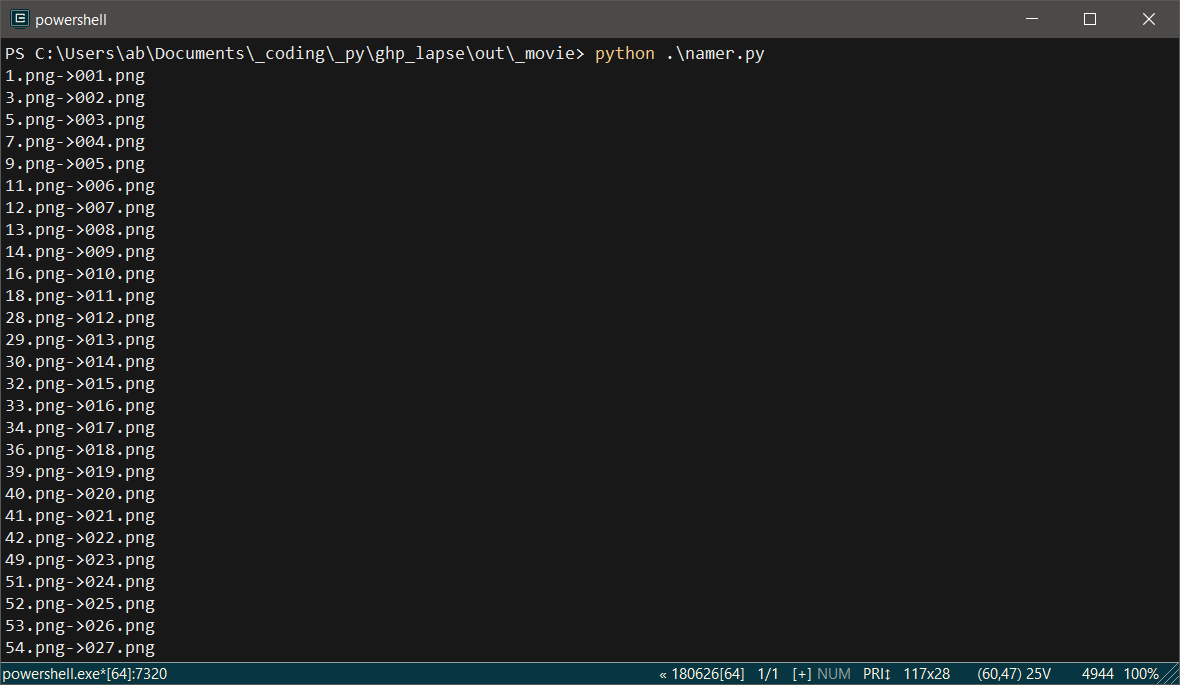This Website
This website is hand-crafted from scratch with the help of Jekyll for the templating, jQuery for the javascript stuff, a little bit of help from Modernizr for backwards-compatibility and is styled with Sass. There is very little external code or styling that is not written by myself and no starting theme was used - thus the lightweight-ness of this website as can be seen today. Source code is available in this website’s GitHub repo.
In the past 10 days of work on this website since its conception, a total of 94 commits were made and a lot of styling was done. Above is a visualisation of the commits pushed, showing the progression of the website during this time.
How this Video was Made
Simply put, I traversed through all of the commits pushed to the repository with Git and built then screenshotted each update with the help of Selenium and overlayed some commit information with PIL with this script I made:
import os
from time import sleep
from PIL import ImageFont, Image, ImageDraw
from selenium import webdriver
from subprocess import run, Popen, PIPE
from datetime import datetime
from selenium.webdriver.chrome.options import Options
cwd=None
def get_name(url):
s = url[url.rfind('/') + 1:]
return s[:s.rfind('.')]
def get_msg():
return read(git('log','-1','--pretty=%B'))[0]
def get_date():
return datetime.utcfromtimestamp(int(read(git('log','-1','--format=%ct'))[0]))
def git(*params):
ps=['git','--no-pager']
ps.extend(params)
if cwd is not None:
result=run(ps,stdout=PIPE,cwd=cwd)
else:
result=run(ps,stdout=PIPE)
return result
def read(result):
ret = []
for line in result.stdout.decode('utf-8').split('\n'):
if line.strip() != '':
ret.append(line)
return ret
def get_config():
if cwd is not None:
with open(os.path.join(cwd,'_config.yml'), 'r') as f:
return f.read()
else:
return None
def cdir(path):
if not os.path.exists(path):
os.makedirs(path)
def overlay_img(text, path, fontpath="lato.ttf", size=16, fore=(255, 255, 255), back=(34, 34, 34), pad=10):
font = ImageFont.truetype(fontpath, size)
with Image.open(path) as img:
w, h = img.size
tw, th = font.getsize(text)
draw = ImageDraw.Draw(img)
draw.rectangle((0, h - th - pad * 2, tw + pad * 2, h), fill=back)
draw.text((pad, h - th - pad), text, fore, font=font)
img.save(path)
def save(driver,overlay,i,path,*locs):
if locs is not None:
cdir(os.path.join(path,*locs))
path = os.path.join(path,*locs, str(i) + '.png')
else:
cdir(path)
path = os.path.join(path, str(i) + '.png')
driver.get("http://localhost:4000/"+('/'.join(locs)))
sleep(1)
driver.save_screenshot(path)
overlay_img(overlay,path)
remote_url=input("Repo URL: ").strip()
git('clone',remote_url)
cwd=get_name(remote_url)
git('checkout','-f','master')
hashes=read(git('log','--pretty=%H'))
print("found "+str(len(hashes))+" commits")
chrome_options = Options()
chrome_options.add_argument("--start-maximized")
driver=webdriver.Chrome('chromedriver.exe',chrome_options=chrome_options)
i=0
for commit in reversed(hashes):
web_dir=os.path.join(cwd,'_site')
git('checkout','-f',commit)
print("@:"+get_msg())
run(['C:\\Ruby24-x64\\bin\\bundle.bat', 'exec', 'jekyll', 'build'],cwd=cwd)
print("jekyll built")
#start server
if os.path.exists(web_dir):
print("serving...")
jproc=Popen(['C:\\Ruby24-x64\\bin\\bundle.bat', 'exec', 'jekyll', 'serve','--skip-initial-build','--no-watch'],cwd=cwd)
sleep(2)
overlay=get_date().strftime('%d/%m/%y %H:%M')+' - '+get_msg()
print(overlay)
save(driver,overlay,i,os.path.join('out','home'))
save(driver,overlay,i,'out','about')
save(driver,overlay,i,'out','h')
save(driver,overlay,i,'out','e')
save(driver,overlay,i,'out','m')
print("screenshotted")
jproc.kill()
print("served")
i+=1
driver.quit()
git('checkout','-f','master')
print("done")
This produces a bunch of screenshot images. I then stitched these images together as a video file with Ffmpeg. Thing is, Ffmpeg (on Windows anyway) doesn’t seem to like it when you try to stitch images that have non-sequential names (I removed a bunch of the frames so there were gaps) so I renamed everything:
import os
import re
def naturalSort(l):
l.sort(key=lambda x:[(int(c) if c.isdigit() else c) for c in re.split('([0-9]+)', x)])
return l
i=1
dirname='home'
for img in naturalSort([ x for x in os.listdir(dirname) if x.endswith('.png')]):
name=f'{i:03}.png'
print(f'{img}->{name}')
os.rename(os.path.join(dirname,img),os.path.join(dirname,name))
i+=1

After renaming, I could succesfully stitch everything with this command:
ffmpeg -r 5 -i about/%03d.png -c:v libxvid -b:v 16000k -pix_fmt yuv420p about.aviThen I added fade and text ‘n stuff~